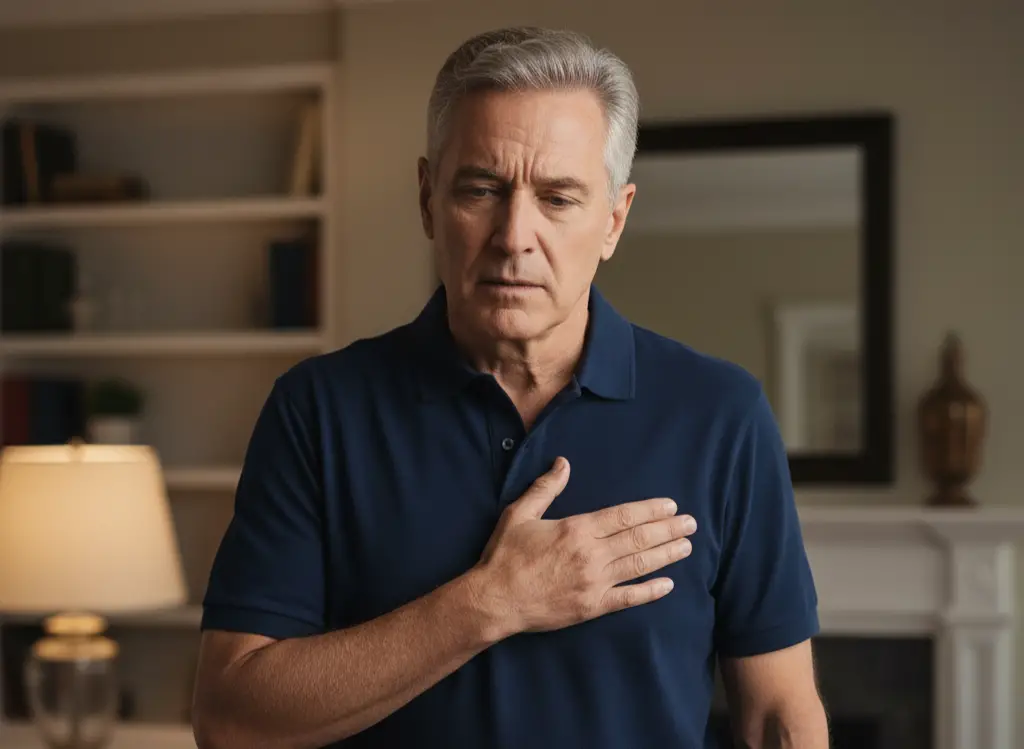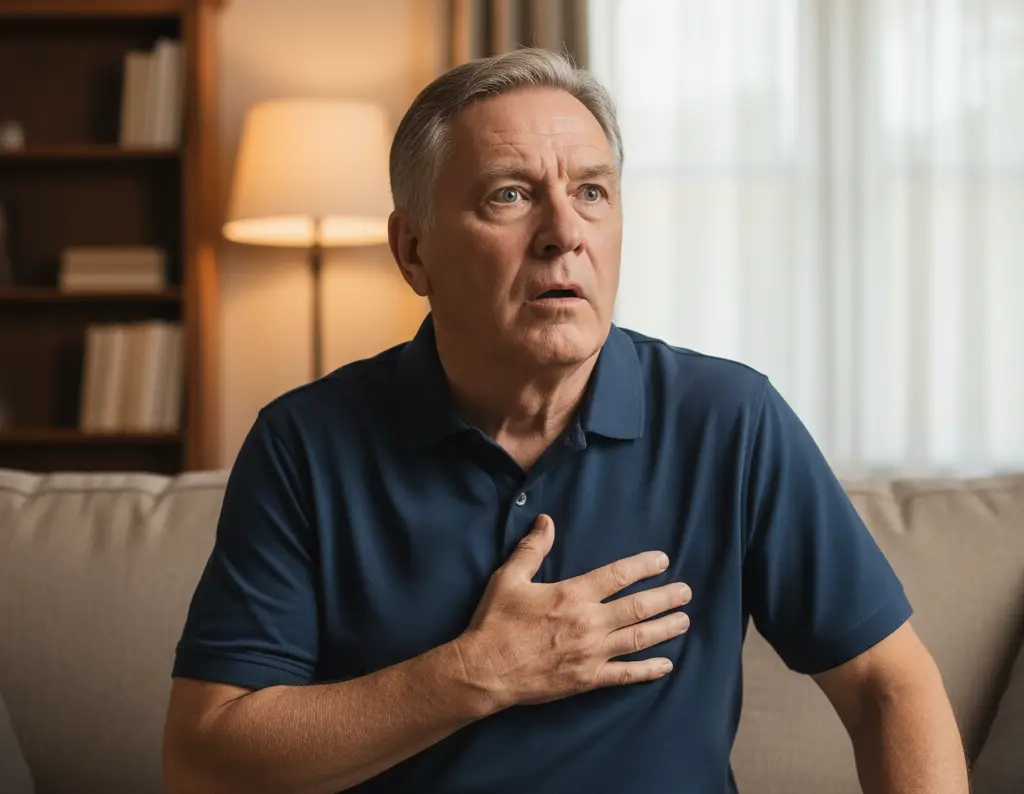The 9 Early Warning Signs of a Heart Attack Every Boomer Should Know

You’ve spent decades taking care of everyone else—your kids, your career, your home. But when was the last time you checked in on the most important machine keeping it all going? Your heart has been beating faithfully for years, often without much attention. Yet as the decades roll on, it starts sending small, subtle signals when it’s under stress. The tricky part? Most people miss those signals until it’s too late.
For baby boomers, who often juggle retirement dreams, family duties, and the occasional stubborn streak of “I’m fine,” knowing the early warning signs of a heart attack isn’t just smart—it’s lifesaving. A heart attack doesn’t always announce itself with the dramatic clutching of the chest seen in movies. Instead, it can whisper, nudge, and hint. The sooner you recognize those whispers, the better your chances of preventing a major health emergency.
Here are nine early warning signs every boomer should keep on their radar, explained in clear, relatable terms—because staying alive to enjoy your golden years should always be part of the plan.
1. Persistent or Unusual Fatigue

If you wake up tired even after a full night’s rest or find yourself running out of steam doing simple tasks like making the bed or walking the dog, your heart might be trying to tell you something. Persistent fatigue that appears out of nowhere can be an early sign that your heart is struggling to keep up with your body’s needs. Women, in particular, often report feeling extremely tired days or even weeks before a heart attack. If you notice that everyday activities suddenly feel like a chore, don’t dismiss it as just “getting older.” Sometimes your body’s exhaustion is actually your heart waving a red flag.
2. Chest Pressure, Discomfort, or “Fullness”

This is the most recognized heart attack symptom, but it doesn’t always feel like what you’d expect. It may not be a sharp pain—it could feel like someone sitting on your chest, a squeezing sensation, or even mild pressure that comes and goes. Some people describe it as a tightness or fullness rather than pain. If the feeling lingers for more than a few minutes or keeps returning, it’s time to act. Don’t wait until it becomes unbearable. Many survivors later say, “It wasn’t that bad at first.” That’s the danger—early chest discomfort can sneak up quietly before escalating into something serious.
3. Shortness of Breath

If you find yourself gasping for air during light activity—or even while resting—it could be more than just being out of shape. When the heart can’t pump blood efficiently, oxygen levels drop, making breathing harder. Some people experience this before any chest pain at all. Imagine climbing one flight of stairs and suddenly feeling winded or unable to catch your breath. That’s a signal worth checking out immediately. If your breathing feels labored and it’s not due to allergies, asthma, or exertion, let your doctor know. Your lungs may be fine—it’s your heart that needs attention.
4. Pain or Discomfort in Other Areas of the Body

Heart-related pain doesn’t always stay in the chest. It can spread to the shoulders, arms, back, neck, jaw, or even the upper abdomen. Some people confuse it for muscle pain or tension, especially after a day of gardening or housework. But if the pain feels unusual, radiates from one area to another, or doesn’t ease with rest, it could be your heart sending a warning. The left arm is the most common area for referred pain, but women and older adults often feel it in their jaw or back. Don’t ignore pain that doesn’t make sense—it could be your heart disguising distress as something ordinary.
5. Nausea, Indigestion, or Heartburn-Like Symptoms

Heart attacks aren’t always dramatic. Sometimes they sneak in disguised as simple indigestion. You might feel queasy, bloated, or experience a burning sensation in your chest that feels like heartburn. Many people brush this off as “something I ate.” But when that feeling strikes suddenly, especially if you didn’t eat anything unusual, it could actually be reduced blood flow to the heart. Women are especially prone to this symptom. If nausea, vomiting, or stomach discomfort appear out of the blue—and especially if they come with sweating or fatigue—it’s time to get checked.
6. Cold Sweats or Sudden Heavy Sweating

If you break into a cold sweat for no clear reason—no exercise, no heat, no stress—it might be your body reacting to a drop in blood flow. People often describe this as clammy skin or sudden chills, even in a cool room. It happens when the heart struggles to pump efficiently, causing your nervous system to go into panic mode. This symptom can appear before or during a heart attack. If you find yourself drenched in sweat without exertion, don’t wait it out. It’s your body’s emergency alarm, and it’s best not to hit the snooze button.
7. Dizziness or Light-Headedness

Feeling dizzy when you stand up too fast is normal. Feeling dizzy for no reason—while sitting, walking, or doing something simple—is not. When your heart isn’t pumping enough blood to your brain, you can feel light-headed, weak, or even faint. Sometimes this is accompanied by chest discomfort or shortness of breath, but not always. If you’ve had moments where the room spins or you nearly black out, don’t chalk it up to “just being tired.” Your heart could be struggling to maintain normal circulation. Especially for boomers, this symptom should never be ignored.
8. Fluttering or Irregular Heartbeat

Ever feel like your heart is doing a little dance inside your chest—skipping beats, fluttering, or pounding unexpectedly? Occasional irregular beats can be harmless, especially after caffeine or stress, but frequent or prolonged palpitations may indicate a heart rhythm problem or early heart distress. When your heartbeat feels uneven or unusually fast, it means your heart’s electrical system is out of rhythm, which can reduce blood flow and strain the muscle. If this happens often or is paired with dizziness, fatigue, or chest pressure, it’s time to see a doctor.
9. Swelling in the Legs, Ankles, or Feet

Swollen feet might seem like a normal part of aging, but they can also be a quiet sign that your heart isn’t circulating blood properly. When your heart weakens, fluid can build up in your legs and ankles, leaving them puffy and tender by the end of the day. You might notice your shoes feeling tight or sock lines leaving deep marks. If the swelling persists or is paired with fatigue and shortness of breath, your heart could be working overtime to move blood through your body. A little swelling might not seem serious, but it’s one of the earliest physical clues of a brewing heart issue.
Final Thoughts

The good news is that your heart usually gives you fair warning—it’s up to you to listen. These symptoms might seem unrelated, but they often work together like pieces of a puzzle. The key is to notice patterns and changes in your normal routine. If you ever experience chest discomfort, shortness of breath, or any combination of these signs, call 911 immediately. Do not wait to “see if it passes.” When it comes to heart attacks, every minute matters.
As a boomer, you’ve lived through decades of ups, downs, and comebacks. You’ve seen trends come and go, from rotary phones to smartphones, from disco to streaming. Don’t let heart disease be the trend that sneaks up on you. Keep your regular checkups, stay active, and treat every symptom as a clue rather than a nuisance.
Your heart has been your lifelong partner—loyal, hardworking, and quietly powerful. It’s carried you through laughter, stress, joy, and heartbreak. Now it’s your turn to return the favor. Listen when it whispers. Act when it signals. And remember: the best years of your life are still ahead—but only if your heart comes along for the ride.
Leave a Reply